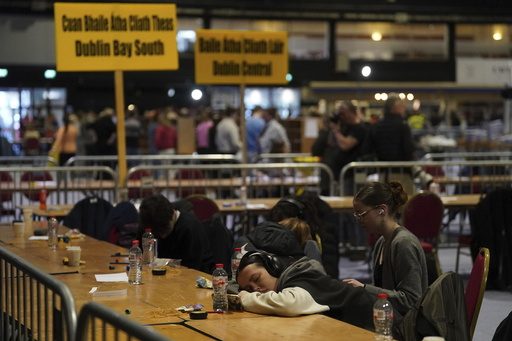DUBLIN — In the wake of a fragmented national election, Ireland’s two historically dominant center-right parties appear poised to form a new government, albeit with diminished electoral support and complicated coalition discussions on the horizon.
As counting of the ballots continued on Sunday, the current governing parties, Fine Gael and Fianna Fail, as well as the left-leaning opposition party, Sinn Fein, were vying for the most seats in the 174-member Dail Éireann, the lower chamber of Ireland’s parliament.
Sinn Fein, which seeks to achieve the unification of the Republic of Ireland with Northern Ireland, faces challenges in securing a governing role since both Fine Gael and Fianna Fail have committed to excluding it from any coalition, largely due to its historical associations with the Irish Republican Army during the extended period of conflict in Northern Ireland.
All three party leaders—incumbent Prime Minister Simon Harris of Fine Gael, Fianna Fail head Micheál Martin, and Sinn Fein leader Mary Lou McDonald—successfully retained their parliamentary positions as the results were announced on Saturday.
Ireland employs a proportional representation electoral system, with its 43 constituencies each electing multiple lawmakers. Voters rank candidates based on their preferences, contributing to the prolonged timeline for announcing complete election results.
“The electorate has made its voice heard,” declared Harris. “We must now interpret the messages from the results, which will understandably take some time.”
Initial outcomes from Friday’s vote indicated that electors distributed their ballots among the major three parties, various smaller entities, and a range of independent candidates. Thus, any resulting coalition is expected to include smaller parties or independents.
Key issues dominating the three-week campaign included the rising cost of living, particularly Ireland’s pressing housing crisis, alongside immigration, which has emerged as a sensitive and challenging topic in a country with a population of 5.4 million that has historically experienced emigration.
If the early voting patterns are confirmed, Ireland may diverge from a global trend where incumbents face rejection due to voter dissatisfaction after enduring years marked by a pandemic, international uncertainties, and economic strain.
The outgoing government was spearheaded by the two parties that have shaped Irish politics for a century. Fine Gael and Fianna Fail share similar policies yet stand as traditional adversaries with roots tracing back to the opposing sides of Ireland’s civil war in the 1920s. Following a near tie in the 2020 election, both parties formed a coalition.
Fine Gael candidate Paschal Donohoe, who served as a minister in the preceding government, described the primary sentiment of the election as being “one of stability.”
Nevertheless, signs of voter dissatisfaction were surfacing in surprising outcomes. Among a significant number of independent candidates was notorious crime figure Gerry “the Monk” Hutch, who garnered considerable support after being released on bail related to money-laundering allegations in Spain, allowing him to run for office.
Preliminary results indicate that Hutch, who was acquitted last year of murder charges connected to a gang rival, is likely to secure a seat in Dublin.



